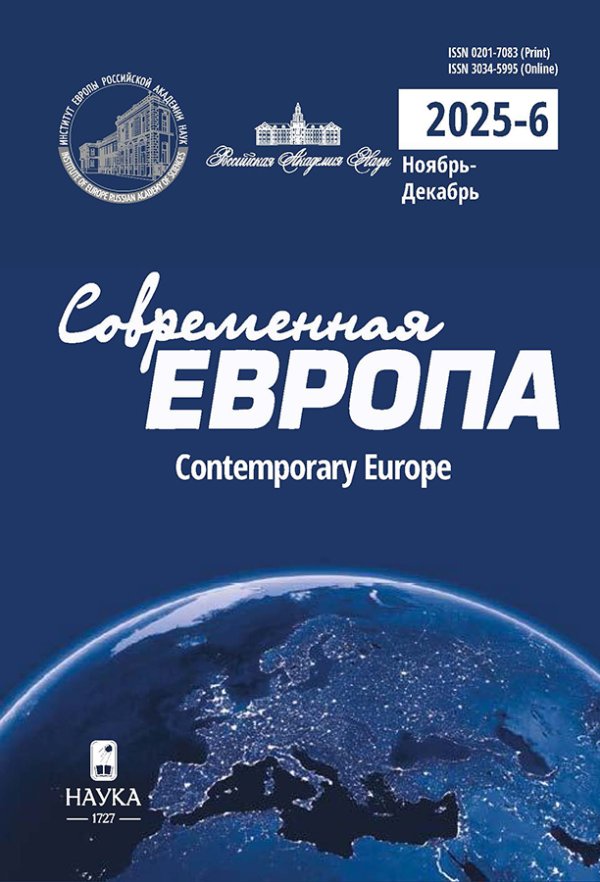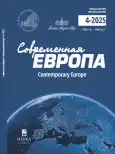Three Forms of Deliberation in Models of Deliberative Democracy
- Authors: Shaveko N.A1
-
Affiliations:
- Institute of Philosophy and Law of the Ural Branch of the Russian Academy of Sciences, Udmurt office
- Issue: No 4 (132) (2025)
- Pages: 137-146
- Section: EUROPEAN PROCESS: COUNTRIES AND REGIONS
- URL: https://bakhtiniada.ru/0201-7083/article/view/308183
- DOI: https://doi.org/10.31857/S0201708325040126
- ID: 308183
Cite item
Abstract
The article examines the theoretical models of deliberative democracy in their opposition to the theoretical models of democratic elitism and participatory democracy. Having briefly described the features of the normative theory of deliberative democracy, the author proposes to distinguish three different forms of deliberation within this theory: microform, macroform and reflexive form. The microform involves discussion in specially formed small groups. The macroform is aimed at a nationwide discussion of socially significant problems (and correlates with direct democracy, defended by participatory democrats). Finally, the third form of deliberation, reflexive, suggests that genuine democracy is impossible without citizens reflecting on decisions made in the public space. It is argued that the distinction between micro- and macroforms of deliberative democracy in itself indicates that deliberative democracy does not completely break with democratic elitism and participatory democracy, since it is forced to lean either to the first or to the second in its assessment of the abilities and desire of citizens to participate in politics. However, some variations of the microform, as well as the reflexive form of deliberative democracy, radically transform the democratic ideal, since the "will of the people" ceases to play a decisive role in them. At the same time, the macroform of deliberative democracy is assessed by the author of the article as unrealistic, and therefore priority is given to the microform and reflexive form. In this regard, it is argued that the democratic theory is undergoing a revolutionary transformation, since democracy ceases to be associated with the will of the people.
About the authors
N. A Shaveko
Institute of Philosophy and Law of the Ural Branch of the Russian Academy of Sciences, Udmurt office
Email: shavekonikolai@gmail.com
Candidate of Sciences (Law), Senior Researcher Izhevsk, Russia
References
- Ackerman B., Fishkin J. (2002) Deliberation day. Journal of Political Philosophy. No. 10(2). P. 129-152. DOI: https://doi.org/10.1111/1467-9760.00146
- Bächtiger A., Setälä M., Grönlund K. (2014) Towards a New Era of Deliberative Mini-Publics. Deliberative Mini-Publics: Involving Citizens in the Democratic Process. Ed. by A. Bächtiger, K. Gronlund, M. Setälä. ECPR Press, Colchester. UK. P. 225-246.
- Cohen J., Sabel Ch. (1997) Directly-Deliberative Polyarchy. European Law Journal. Vol. 3. No. 4. P. 313-342. DOI: https://doi.org/10.1111/1468-0386.00034
- Crosby N. (1999) Using the citizens' juries: a process for environmental decision making. Making better environmental decisions. Ed. by K. Sexton, A.A. Marcus, K.W. Easter, T.D. Burkhardt. Island Press, Washington, USA. P. 401-417.
- Dell'Aquila M., Grabova O., Heszterényi R., Mizsei B., Yu-Cheong Yeung T. (2024) Realising the democratic ideal: empowering marginalised voices in deliberative democracy. CEPS In-depth Analysis. 12.12. URL: https://www.ceps.eu/ceps-publications/realising-the-democratic-ideal-empowering-marginalised-voices-in-deliberative-democracy/ (дата обращения: 02.12.2024).
- Dienel P.C., Renn O. (1995) Planning cells: a gate to "fractal" mediation. Fairness and competence in citizen participation. Ed. by O. Renn, Th. Webler, P. Wiedemann. Springer, Dordrecht, Netherlands. P. 117-140. DOI: https://doi.org/10.1007/978-94-011-0131-8_6
- Dryzek J.S. (1990) Discursive Democracy: Politics, Policy, and Political Science. Cambridge University Press, Cambridge, UK. 254 p. DOI: https://doi.org/10.1017/9781139173810
- Fishkin J.S. (2009) When the People Speak. Deliberative Democracy and Public Consultation. Oxford University Press. 256 p. DOI: https://doi.org/10.1093/acprof:osobl/9780199604432.001.0001
- Goodin R.E. (2003) Reflective Democracy. Oxford University Press. 279 p. DOI: https://doi.org/10.1093/0199256179.001.0001
- Gutmann A., Thompson D. (2004) Why deliberative democracy? Princeton University Press. 232 p. DOI: https://doi.org/10.1515/9781400826339
- Habermas J. (1992) Faktizität und Geltung. Beiträge zur Diskurstheorie des Rechts und des demokratischen Rechtsstaats. Suhrkamp, Frankfurt a. M., Germany. 666 p.
- Hendriks C. (2002) Institutions of deliberative democratic processes and interest groups: roles, tensions and incentives. Australian Journal of Public Administration. No. 61(1). P. 64-75. DOI: https://doi.org/10.1111/1467-8500.00259
- Jacobs K. (2024) Have a Little Faith in Deliberation? Examining the Effect of Participation in a Citizens' Assembly on Populist Attitudes. Contemporary Politics. Vol. 30. No. 4. P. 512-533. DOI: https://doi.org/10.1080/13569775.2023.2296725
- Joss S., Durant J. (ed.) Public participation in science: the role of consensus conferences in Europe. NMSI Trading, London, UK. 144 p.
- Mutz D. (2006) Hearing the other side. Deliberative versus Participatory Democracy. Cambridge University Press. 184 p. DOI: https://doi.org/10.1017/cbo9780511617201
- Paulis E., Pilet J.-B., Panel S., Vittori D., Close C. (2021) The POLITICIZE dataset: an inventory of deliberative mini-publics (DMPs) in Europe. European Political Science. No. 20. P. 521-542. https://doi.org/10.1057/s41304-020-00284-9
- Paulis E., Pospieszna P. (2024) Deliberative mini-publics as learning schools for democracy? Examining deliberation impact on dissatisfied and radical participants of a citizens' assembly in Poland. Democratization. P. 1-24. DOI: https://doi.org/10.1080/13510347.2024.2422508
- Rawls J. (1997) The idea of public reason revisited. The University of Chicago Law Review. No. 94. P. 765-807. DOI: https://doi.org/10.2307/1600311
- Suteu S. (2019). The Populist Turn in Central and Eastern Europe: Is Deliberative Democracy Part of the Solution?. European Constitutional Law Review. Vol. 15. Issue 3. P. 488-518. DOI: https://doi.org/10.1017/S1574019619000348
- Uhr J. (1998) Deliberative democracy in Australia: the changing place of parliament. Cambridge University Press, Cambridge, UK. 265 p.
Supplementary files










